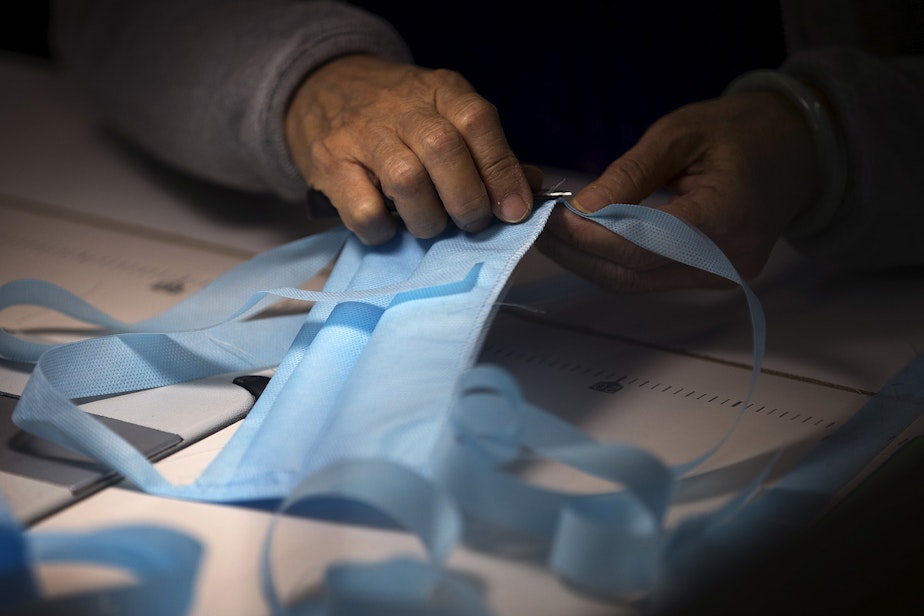Are you wearing the right mask? It comes down to fit and layers

Masks slow the spread of Covid-19, protecting both the wearer and others. But are we wearing the right mask? Here’s what experts say.
Fit and layers.
Fit is key. If a mask doesn’t fit well, it can allow droplets to leak in or out.
Look for masks that have nose wires to allow for a tight fit over your nose.
A snug fit on the face is also desired. Big gaps on the sides of a mask near your cheeks indicate poor fit.
The mask should also be able to stay in place, covering both the nose and mouth. If your mask is being pulled below your nose when you talk, that's a problem.
Sponsored
“The best mask is actually the one that you’ll wear, and you’ll wear correctly," said Dr. Chloe Bryson-Cahn, associate medical director for infection prevention and control at Harborview Medical Center. "Make sure when you’re picking your mask, it’s going to stay up over your nose and cover your mouth as well.”
The number of fabric layers in a mask is also important for good protection. Ply = layer.
The Centers for Disease Control and Prevention recommends two or more layers. Multiple layers help reduce the risk of droplets getting through the fabric.
“You don’t want to be able to see sunshine through your mask,” said Bryson-Cahn.
So: Get a mask with two or three layers built in, wear two masks, or add a filter.
Sponsored
Which masks are most effective?
In general, N95 and KN95 masks are seen as the most effective as long as they are genuine and fit correctly.
Next are surgical masks that have been tested to meet certain standards, followed by cloth masks with multiple layers, according to Public Health – Seattle & King County.
At the beginning of the pandemic, there was a shortage of masks and the more effective N95, KN95, and surgical masks needed to be reserved for healthcare workers.
Supply has now improved, and there are more of these masks available to the general public.
With the rise of the delta variant, some experts have taken to recommending higher filtration masks over cloth masks.
Sponsored
However, there are also counterfeit masks on the market. The Centers for Disease Control breaks down how to spot a counterfeit.
What masks should kids be wearing?
Masking is recommended for kids 2 and older. Pediatricians stress that the best masks for kids are the ones they’ll wear.
Dr. Rupin Thakkar, lead physician at Swedish pediatrics in Edmonds, said cloth masks are adequate to protect children. He said the fit and the number of layers are the most important thing.
“If a mask is not stretching from ear to ear, if it’s not fitting snugly on the sides, then it’s not the right mask — no matter what material it’s made out of,” Thakkar said.
There are some higher filtration masks, like the KN95s, that can be found in children's sizes.
Sponsored
When should you change your mask?
If a mask is wet, visibly dirty, or smelly, it should be changed.
“With a wet mask, that’s just not going to protect you or block respiratory droplets from going out,” said Dr. Surabhi Vora, infectious disease physician at Seattle Children’s Hospital.
She said she always packs an extra mask in her daughter’s backpack and tells her to be liberal in the decision to switch it out.
Vora tells her daughter: “If it’s dirty, if it’s wet, if it’s not fitting right, if the string breaks or whatever, please throw it away and use a new one.”
Sponsored
If using a mask for brief periods, like going into the grocery store, Dr. Bryson-Cahn said it is fine to take the mask off and re-use it again later.
However, she said people should be aware that if they’re touching the outside of the mask while taking it off that’s where droplets containing the virus could be, so they should wash their hands afterwards and hang the mask in a safe place.
If a mask has been worn for an entire day, by kids at school, for instance, it should be washed or disposed of.
Are there masks people should avoid?
According to the CDC, people should stay away from masks made of fabric that makes it hard to breathe, like vinyl.
Experts also urge people not to wear masks with exhalation valves. Those kinds of masks are good at protecting the wearer, but do not protect those around them as they don’t filter anything coming through the valve.
People should also avoid counterfeit masks.
Should people mask during the holiday as they gather with family and friends?
Experts stress that vaccination is best thing people can do to keep themselves and others safe.
Whether or not to mask while gathering with friends and family during the holidays is a big question, said Dr. Bryson-Cahn with Harborview Medical Center.
Bryson-Cahn said via email that people who are gathering with unvaccinated individuals, immunocompromised individuals, or large groups should consider the risk.
“Masks go a long way to decreasing the transmission risk,” she said.
Bryson-Cahn said people in these situations could consider masking for most of the time, removing their mask only to eat, or eating outside.




